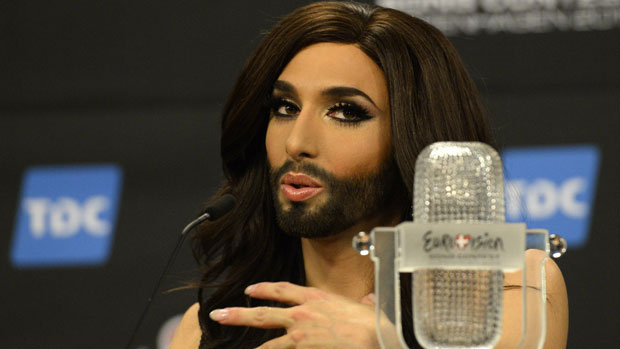Russia's Eurovision secret is out: voters backed Conchita
Judges in Russia, Armenia and Belarus marked her down - but it turns out the public are more tolerant

A free daily email with the biggest news stories of the day – and the best features from TheWeek.com
You are now subscribed
Your newsletter sign-up was successful
In a slinky dress, heavy eye make-up and a luxuriant black beard, Austrian diva Conchita Wurst claimed the Eurovision trophy on Saturday night. The singer, real name Tom Neuwirth, dedicated her win to “peace and freedom” after facing abuse and official disapproval over recent months.
Wurst was always a favourite to win. What’s more unexpected is that the citizens of Russia, Armenia and Belarus - three nations which the BBC said all objected to Wurst’s ambiguous presence in the song competition - used their telephone votes to send a message of tolerance.
Ahead of the competition, The Independent reported a petition of 15,000 Russians demanding their state TV broadcaster drop the “hotbed of sodomy” from its schedule because of Wurst’s participation. Armenia’s contestant, Aram MP3, said Wurst’s lifestyle was “not natural” and she should “decide whether she is a woman or a man” (he later said it had been “a joke”).
The Week
Escape your echo chamber. Get the facts behind the news, plus analysis from multiple perspectives.

Sign up for The Week's Free Newsletters
From our morning news briefing to a weekly Good News Newsletter, get the best of The Week delivered directly to your inbox.
From our morning news briefing to a weekly Good News Newsletter, get the best of The Week delivered directly to your inbox.
The Guardian reported that the Russian politician who inspired the country’s repressive anti-gay laws, Vitaly Milonov, wrote to Russia’s Eurovision committee asking it to boycott the event because it was a “Sodom show” and a “Europe-wide gay parade”.
In short, Wurst faced a “transphobic backlash” from “conservative protesters in Russia, Armenia and Belarus” as the BBC put it.
On Saturday night, the scoring seemed to support this. Armenia and Belarus gave Conchita's torch song ‘nul points’ - while Russia allowed her a grudging five (12 is the maximum). So far, so predictable.
But much more interesting is how the public of those three nations voted.
A free daily email with the biggest news stories of the day – and the best features from TheWeek.com
As well as its own panel of five expert judges, each of the 37 participating nations runs a public telephone vote - the two results are then averaged. This year, for the first time, a breakdown of how the public and the judges voted has been released.
The figures show the Armenian public decided Wurst was their second favourite contestant out of the 25, while Russians ranked her third - and Belarus gave her a respectable fourth place. It was only after the carefully chosen judging panels had their say that Wurst’s ranking plummeted in all three nations.
So does Conchita Wurst’s win mark a backlash to the backlash, showing that the regime voices raised against her were out of step with a tolerant majority?
Possibly - but, of course, Eurovision watchers are a specialised bunch, who may well be predisposed to like Wurst. As Wurst herself said about about the controversy: “Eighty per cent of the autograph requests that I get are from Russia and eastern Europe.”
While the contest as a whole remains ineluctably silly, Wurst has become a serious figure of hope for at least some people living under the shadow of officially-sanctioned intolerance.
-
 6 of the world’s most accessible destinations
6 of the world’s most accessible destinationsThe Week Recommends Experience all of Berlin, Singapore and Sydney
-
 How the FCC’s ‘equal time’ rule works
How the FCC’s ‘equal time’ rule worksIn the Spotlight The law is at the heart of the Colbert-CBS conflict
-
 What is the endgame in the DHS shutdown?
What is the endgame in the DHS shutdown?Today’s Big Question Democrats want to rein in ICE’s immigration crackdown
-
 Epstein files topple law CEO, roil UK government
Epstein files topple law CEO, roil UK governmentSpeed Read Peter Mandelson, Britain’s former ambassador to the US, is caught up in the scandal
-
 Iran and US prepare to meet after skirmishes
Iran and US prepare to meet after skirmishesSpeed Read The incident comes amid heightened tensions in the Middle East
-
 Israel retrieves final hostage’s body from Gaza
Israel retrieves final hostage’s body from GazaSpeed Read The 24-year-old police officer was killed during the initial Hamas attack
-
 China’s Xi targets top general in growing purge
China’s Xi targets top general in growing purgeSpeed Read Zhang Youxia is being investigated over ‘grave violations’ of the law
-
 Panama and Canada are negotiating over a crucial copper mine
Panama and Canada are negotiating over a crucial copper mineIn the Spotlight Panama is set to make a final decision on the mine this summer
-
 Why Greenland’s natural resources are nearly impossible to mine
Why Greenland’s natural resources are nearly impossible to mineThe Explainer The country’s natural landscape makes the task extremely difficult
-
 Iran cuts internet as protests escalate
Iran cuts internet as protests escalateSpeed Reada Government buildings across the country have been set on fire
-
 US nabs ‘shadow’ tanker claimed by Russia
US nabs ‘shadow’ tanker claimed by RussiaSpeed Read The ship was one of two vessels seized by the US military